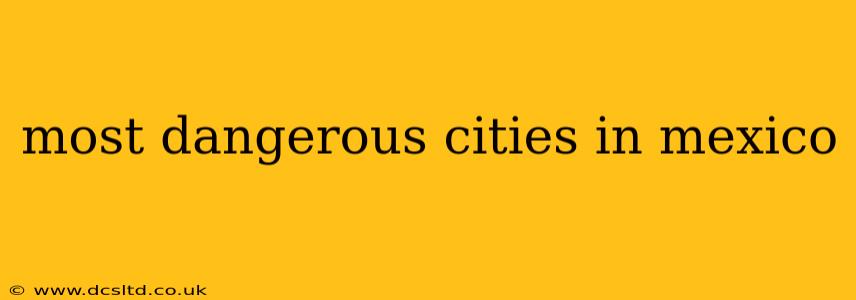Mexico, a land of vibrant culture, stunning landscapes, and rich history, also faces significant challenges related to crime and violence. While the vast majority of Mexico is safe for tourists and residents alike, certain cities experience higher rates of crime than others. This article aims to provide a nuanced and comprehensive look at the cities often cited as the most dangerous in Mexico, exploring the complexities behind the statistics and offering context for travelers and residents. We'll also address frequently asked questions surrounding safety in Mexico.
What are the most dangerous cities in Mexico?
Several Mexican cities consistently appear on lists of the world's most dangerous. It's crucial to understand that these rankings often rely on homicide rates, which don't always reflect the complete picture of safety and security. Factors like petty crime, drug-related violence, and levels of corruption also play a vital role. Nevertheless, cities frequently cited include:
- Tijuana: Located on the US-Mexico border, Tijuana struggles with organized crime and drug trafficking, leading to high rates of violence.
- Ciudad Juárez: Another border city, Ciudad Juárez has historically experienced high levels of drug-related violence and gang activity.
- Guadalajara: While a major tourist destination, Guadalajara also experiences significant crime, particularly related to drug cartels.
- Acapulco: Once a popular tourist haven, Acapulco has seen a rise in crime rates in recent years, impacting both residents and visitors.
- Mexicali: Similar to Tijuana and Ciudad Juárez, Mexicali's proximity to the border and involvement in drug trafficking contributes to its high crime rates.
These are not exhaustive, and other cities experience significant crime challenges. It is important to consult up-to-date travel advisories and local news before visiting any city in Mexico.
What are the main causes of high crime rates in these cities?
The high crime rates in these cities are often attributed to a complex interplay of factors:
- Drug trafficking: Mexico's proximity to the United States, a major consumer of drugs, makes it a key transit point and a battleground for various drug cartels. This fuels violence and instability.
- Poverty and inequality: Significant socioeconomic disparities create fertile ground for crime, as marginalized communities may resort to illegal activities out of desperation.
- Corruption: Corruption within law enforcement and government institutions can hinder effective crime prevention and prosecution, further exacerbating the problem.
- Weak rule of law: In some areas, the government's capacity to effectively enforce the law is limited, allowing criminal organizations to thrive.
- Gang violence: Powerful and well-armed gangs fight for territory and control over various criminal activities, often leading to violent confrontations.
Are tourist areas safer than other areas?
While some tourist areas may have increased security measures, it's inaccurate to assume that all tourist areas are inherently safe. Crime can occur anywhere, and even popular tourist destinations can experience petty theft, scams, or more serious incidents. Staying vigilant, being aware of your surroundings, and taking necessary precautions is crucial regardless of your location.
What safety precautions should tourists take in Mexico?
Regardless of your destination in Mexico, proactive safety measures are vital:
- Research your destination: Familiarize yourself with the safety conditions of your specific destination before you travel.
- Avoid displaying expensive jewelry or electronics: This can attract unwanted attention.
- Be aware of your surroundings: Pay attention to your environment and avoid walking alone in poorly lit or isolated areas, particularly at night.
- Register with your embassy or consulate: This will help them assist you in case of an emergency.
- Stay in well-reviewed accommodations: Choose hotels or accommodations with a good reputation for safety and security.
- Use reputable transportation: Avoid unlicensed taxis or ride-sharing services.
How accurate are the "most dangerous cities" rankings?
It's important to treat rankings of "most dangerous cities" with caution. These rankings often rely primarily on homicide rates, which don't fully encapsulate the overall security situation. Other crimes, like petty theft, fraud, and extortion, are not always adequately reflected in these statistics. Moreover, data collection and reporting methods can vary between cities and countries, influencing the accuracy of comparisons.
This article provides information based on publicly available data and reports. For the most up-to-date safety information, consult official government travel advisories and reputable news sources. Remember that responsible travel involves being informed, aware, and prepared.
